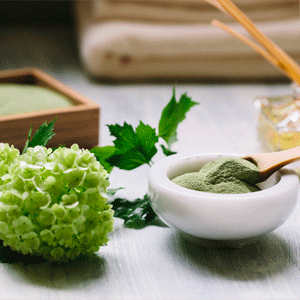
Superfood spirulina packs a real nutritional punch with its high levels of protein, B-vitamins and iron. Is this the superfood you need in your life?
Here are some answers to questions people regularly ask about these marvellous micro-algae:
What does spirulina look and taste like?
“Spirulina” refers to bright-green algae that grow in alkaline lakes, and which are then dried and powdered. The taste varies according to the species of spirulina, but the consensus is that it tastes like seaweed – which, unfortunately, few people like.
You can, however, disguise the taste by mixing spirulina into apple or pomegranate juice.
What if I don’t like the taste?
If you don’t like the taste of spirulina powder or paste, you can always take it in tablet form.
What are the main benefits of taking spirulina?
Spirulina is a rich source of antioxidants and is thought to relieve allergy symptoms in adults, reduce blood-sugar levels in diabetics, lower cholesterol levels, and reduce anxiety and depression in menopausal women.
Some people also use it to alleviate premenstrual syndrome (PMS), fatigue and memory problems, and to encourage wound healing and good digestive health. At this stage, study results for all these uses are still preliminary.
Read: The dangers of herbs
What is the difference between fresh spirulina and dried spirulina?
Fresh spirulina is said to be almost tasteless, while dried spirulina can have a strong taste and smell. The drying process does reduce some of the vitamin content, although not significantly.
Who took it first, and why?
No one really knows this, but the Aztecs were reportedly spirulina eaters, as are the people who live around Lake Chad.
Where does it come from?
Today most of the spirulina comes from commercial production plants the world over. It’s not easy to grow, as it requires a stable ecology in the water, and must be uncontaminated by pollution.
I have heard spirulina can give you metal poisoning. Is this true?
If it’s grown in a polluted environment, or an environment in which there are chemical fertilisers, then the answer is “yes”. Spirulina easily absorbs the nutrients from the water in which it grows and can also be contaminated with microbes – all the more reason why it’s important to get your spirulina from a well-regulated, reputable source.
Read: Discover spirulina as a superfood
How much protein is there in spirulina?
Approximately 60% of spirulina is made up of protein.
Can I grow spirulina myself?
Yes, you can. You’ll need an aquarium, a sunny spot in your home and a commercially sold spirulina kit.
Is there anyone who should not take spirulina, and why?
While it’s generally safe to take spirulina, the University of Maryland Medical Centre advises against it for people with autoimmune diseases, as it possibly interferes with medication given to suppress the immune system. They advise that women who are pregnant or breastfeeding should talk to their doctors before taking spirulina. And children should preferably steer clear of spirulina, as they’re more sensitive to poisoning (a possible result of contamination).
How should spirulina be stored?
Spirulina paste should be kept in the refrigerator, but dried spirulina can be stored outside the refrigerator in a cool, dark place for long periods of time.
Read: How to grow a herb garden
How should spirulina be taken?
It can be taken as is, or in a paste or powdered form. Spirulina can be added to juice, mixed into smoothies or taken in tablet form. It can be added to any food, but avoid excessive cooking or microwaving as this can lower its nutritional value.
Can I boil or cook it in food?
Yes, you can. But prolonged exposure to heat will diminish its nutritional value. It’s recommended that you add the spirulina powder or paste just before serving the food.
Can I take too much spirulina?
Many sources say you can’t overdose on spirulina as it’s a natural food source, but when taken in excess (as with any foodstuff), it could cause problems. In this case, it could lead to a vitamin A overdose.
Is spirulina OK for vegans?
Absolutely. It’s a very good source of vegetable protein.
Read more:
Buchu - South Africa's 'miracle herb'
How safe are herbal medicines?
Are alternative medicines in trouble in SA?
Image: Spirulina powder in a bowl from iStock
Sources
University of Maryland Medical Centre; Energaia.com; Grow Spirulina; Growing Raw,




 Publications
Publications
 Partners
Partners










